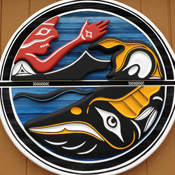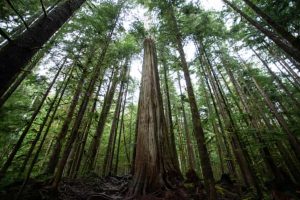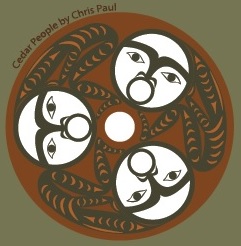 This page was originally focused on support settler unlearning before visiting Ada’itsx, unceded Pacheedaht, Ditidaht, and Huu-ay-aht territory to participate in the Fairy Creek Blockade. Since that land defence “concluded,” if that’s what can be said about it, it has become more obvious to witnesses like me (Kikila) that we settlers (especially those of European descent) need to do some work before we show up in Indigenous-led spaces.
This page was originally focused on support settler unlearning before visiting Ada’itsx, unceded Pacheedaht, Ditidaht, and Huu-ay-aht territory to participate in the Fairy Creek Blockade. Since that land defence “concluded,” if that’s what can be said about it, it has become more obvious to witnesses like me (Kikila) that we settlers (especially those of European descent) need to do some work before we show up in Indigenous-led spaces.
If you’ve been called to support Indigenous-led programming, actions, activities and events, please take a moment to reflect on a few things. Like your motivations for going there.
In the Resources section there is a page that has 5 downloadable ‘zines that were created specifically to support settler unlearning before we arrive in Indigenous-led (and here specifically Coast Salish) settings. Please feel free to download them and share them.
If it not the job of the Indigenous matriarchs, leaders, and land defenders who invite our support to educate us on the basics. For the good of all future relationships between the Indigenous peoples of these territories and settler environmentalists and activists on these territories, this is very important.
- Are you prepared to accept Indigenous Sovereignty?
- Do you think that protecting old growth forests are more important than Indigenous self-determination on their territory?
- Are you aware of the protocols for holding protest on these territories?
- Are you aware of “protocols” in general (as a concept)?
- Did you know your presence can be triggering?
- Do you make space for BIPOC & LBGTQ2+ voices?
- Why are you going? Do you know anyone from Pacheedaht, or from the Nations who share territory with them? Do you know what Nations you will pass through to get to Fairy Creek?

If this path is new to you, the path of decolonization and working as a visitor in Indigenous sovereignty, then please take a look at the below resources. They are in no way the “ultimate collection” and they are not the “final say.” Both those ideas are colonial.
These are staring points. Sit with them. Ask yourself why they give you the reaction you are feeling, and then sit with them again. As (Dr.) Rob Hancock (Cree-Métis) shared with me once, “If you react with an Assimilatory, Paternalistic, or Racist idea or feeling to the subject matter, please keep it to yourself [when interacting with Indigenous peoples] and self-reflect on those reactions.” My suggestion is to reflect with other settlers who are undertaking this work, if you can (my contact info is below).
Before you complain about these resources being academic or not based in Land Defence, please remember to take a deep breath. This work is going to be hard and challenging for you. Just because you do not agree with where it is coming from does not mean the information is not valid, or was not created by Indigenous peoples to help our understanding. When compared to the daily experiences of our Indigenous hosts, the People of Colour who call for our allyship, and LBTGQ2+ and feminist resisters who have to live and breath this every day for survival, the very least you can do is read something you don’t want to read.
Start by exploring how you (even if you are not European-descended) support and reproduce White Supremacy Culture by reading this essay by Tema Okun.
 “Indigenous Ally Toolkit” (link opens a PDF) by Montreal Urban Aboriginal Community Strategy Network.
“Indigenous Ally Toolkit” (link opens a PDF) by Montreal Urban Aboriginal Community Strategy Network.
“Decolonization is not a metaphor” (link downloads a PDF) by Eve Tuck (Unangax̂) and K. Wayne Yang
“Two-Eyed Seeing: A Framework for Understanding Indigenous and non-Indigenous Approaches to Indigenous Health Research” (link downloads PDF) by Debbie H. Martin
“The Ethical Space of Engagement” (link downloads a PDF) by Willie Ermine (Sturgeon Lake First Nation)
Learn from knowledge holders like Elaine Alec (Syilx and Secwepemc) and find out how to Cultivate Safer Spaces.
“Unsettling settler colonialism: The discourse and politics of settlers, and solidarity with Indigenous nations” (link opens a PDF) by Snelgrove, Dhamoon, and Corntassel (Tsaligi).
 The Language of the Land: A Multigenerational Wisdom Council (on YouTube), hosted by the Alliance for Intergenerational Resilience (AIR).
The Language of the Land: A Multigenerational Wisdom Council (on YouTube), hosted by the Alliance for Intergenerational Resilience (AIR).
(Full disclosure, AIR honours me by having me as a board member and they honoured me by inviting me to witness this gathering).
If you’d like to contact me about any of this please do: kikilaperrin@uvic.ca, @KikilaBodhi on Twitter & kikilaperrin on instagram. It might take me a few days to reply (especially on social media). let’s try and be good visitors, good supporters, and eventually good neighbours.
This is a start. You ought to seek out relationships with Indigenous peoples on the territories that support you. Reading and re-reading can only get us so far, and if our relationships are only with other settlers (of any colour) how are we actually supporting Indigenous sovereignty?
This is a journey and a practice, and it is one that we must walk every day of our lives. Otherwise, what are we doing?
